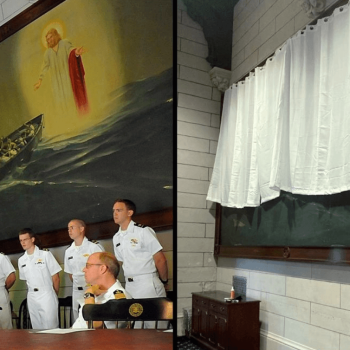"You don't hit bottom," says an old twelve-step adage, "until you stop digging." In other words: no bad experience, painful consequence, or downright awful time in and of itself will lead people to change. When we are thoughtless, reckless, destructively selfish, or blind to the effects of our actions on ourselves and others—and when all this leads in a Very Bad Direction, we can still hold on to the negative habits and damaging behavior. We can always close our eyes, turn our backs, and deny, deny, deny.
Hurricane Sandy—a mega, super, Franken storm—is a case in point. I would very much like it to be a cliché that such storms, predictable aspects of global climate change, are what our current use of fossil fuels is getting us; and that therefore our political, economic, technological, educational, and spiritual leaders are doing everything in their power to help us change our ways.
But the sad truth is that outside of the still comparatively limited environmental community, and the occasional policy nod toward "maybe doing something serious at some point," our leaders are pretty much ignoring reality. Yes Bill McKibben and 350.org, the Sierra Club and the odd religious leader, are beating the band. A few minor politicians here and there are doing their best. The odd editorial in the Times or upset piece in a progressive magazine appears.
But where is the outcry, the demand, the absolute shriek of assertion that now, and not sometime after the fabled future economic recovery, is the time to change. Where are the non-stop headlines in the press about the relation between human action and the size of these new storms? Or the headlines proclaiming "Presidential debates completely ignore most important issue of our time!!!!"? Where are heads of cabinet departments, speakers of the House and leaders of the Senate, presidents, would-be presidents, vice-presidents and joint chiefs-of-staff, and all the others sworn to protect our country? Where is the deafening din of condemnation when a politician dares, as Romney has, to distinguish the health of the planet from the wellbeing of "your family"?
Where are they? If you follow such things you know that for the most part they are Someplace Else.
As I asked last week about presidential politics, I'll ask again: is there a spiritual response to all this?
First of all, I suggest that it's not "wrong" or "unspiritual" to be angry, to be critical, to be willing to say—in public and as loudly as you can to anyone who will listen—"this is just not okay, this is hurtful, and it is not some abstraction called 'global warming' or 'an environmental problem'." This is people killed, lives shattered, precious homes and property lost, beloved landscapes scarred, and our economy subject to a dreadful blow. And if there is some anger, frustration, or even a little desperation in your tone, that's all right.
There is nothing particularly spiritual about always being pleasant. Even the Dalai Lama admitted that "impatience in the cause of world peace" could be a positive emotion. Speaking truth to power is certainly part of the spiritual style—the authentic spiritual style, in any case. For more details consult the writing—or, even better, the lives—of Martin Luther King, Gandhi, Dorothy Day, Abraham Joshua Heschel, Joan Chittister, Michael Lerner, Jim Wallis, Aung Sang Suu Kyi, or the prophet Isaiah.
Alongside the anger, however, there is the need to take it all in and recognize that this is simply the way things are. It makes little difference how correct those of us who talk about environmental problems are, how much truth is on our side, and how far worse things than Sandy are in store for all us. Reality, unfortunately, rarely goes away because we get angry, even if we have good reasons for the way we feel.
For comparison, we might think of the feminist thinkers of the 1600s. There were a few—women inspired by the Reformation's emphasis on individual choice and conscience, visionaries who realized that women could be as godly as men, and have insights that deserved recognition and respect. History has confirmed the essential truth of these women—but it sure took a long time for that to happen.
Environmentalists of today may face a comparable wait. It could be decades, even centuries, before it becomes commonly accepted that reckless development, wasteful consumption, and the poisons that flow from nuclear plants and military hardware are all to be shunned; that oil is a precious gift from our ancestors, and not to be so casually, cavalierly, and carelessly consumed; or that animals are conscious beings, centers of experience and enjoyment even as people are. Ultimately, as humans have (for the most part!) learned that murder is wrong, slavery has no part in civilized life, and people have rights, so we may learn the commonplaces of environmentalism: love of life, respect for ecosystems, modesty in consumption, great care in the implementation of technology, and that community and personal virtue are the sources of true well-being and consumerism is not.





